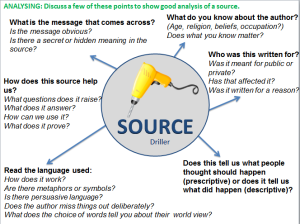About to get back on the horse….
Teaching-As-Persuasion
Daniel Pink’s talk at The RSA discusses how everybody today is involved in some form of selling. We all have to, at some point in our working lives, persuade other people to listen to us, to change the way they are doing things or get somebody else to allow us to do something different from what we may have originally been assigned to do. The art of persuasion is, Pink suggests, akin to the art of selling.
Similarly, every day in every classroom, every educator is engaged in the gentle and not-so-gentle art of persuasion. Of ‘selling’ learning.
From the first to the last bell, educators around the globe are engaged in this complex and necessarily sophisticated act. We operate in a world where goal of the educator is to constantly persuade learners to make a transaction. To give their attention to the lesson topic and to invest their time in doing something different from…
View original post 529 more words
Source Driller (For analysing History Sources)
I’m using some primary sources in my lesson tomorrow and decided I’d quickly knock up a help sheet to pin to my challenge wall so that students who really want to go to town on the sources can do so. I’d say this resource will probably work best with students who are working around lvl 5/6 or higher, but it may be useful for anyone really.
It was just a quickie so I might modify or adapt the language and the resource a bit yet. Let me know if it is useful at all.
ORIGINAL PPT
Give me a decent ladder to climb…
After listening to Tim Oates tell us all about why levels are out, I think I’m looking forward now to assessing without them, and I feel a lot less apprehensive.
Already there’s a change in the air – people are talking a lot more about specific steps in learning rather than who’s a level 3 or who’s only a 2! It’s no wonder we got too into the numbers though, everyone around us did, and quite honestly it’s very hard for teachers not to fixate on learning in a narrow way when everyone who’s judging them is fiercely and mercilessly holding a telescopic sight on the numbers too.
The problem was the preoccupation with ‘levels over learning;’ no one meant to do it, it just crept up on us, didn’t it? Although I don’t agree with everything Tim Oates has said, I do agree that pressure for ‘getting through the levels’ rather than mastering…
View original post 492 more words
Success! Whose success? – has the success criteria become just another tool for transmission in your classroom?

So many times in education new things sweep through classrooms. There is a great rustling of excitement, teachers rush to use this latest tool…hopefully there are some good effects to learning, but then the new gimmick (that you were sure wasn’t just a trick) gets sucked into the gurgling whirlpool of curriculum coverage. (Whaa! Hang on to a branch – save yourself!) Also – the last tidal wave of Ofsted wanting pace and challenge has meant at times pupils barely have time to pause and think – gotta be active, active, active. Let’s hope we didn’t forget the learning too! (Thankfully I think they noticed the pendulum swinging away there – I hope).
The truth is, these new things are usually based on common sense ideas, but dressed up in fancy, new clothes and somehow, some way, we all take more notice of the fancy clothes than the common sense. I hope…
View original post 795 more words
Enquiry based learning
Long time, no blog!
Earlier this academic year, I became involved in an enquiry based learning focus group. Having dabbled with EBL in maths and science last year, I have developed a range of strategies to use EBL techniques in foundation subjects as a means of differentiating and challenging.
Enquiry based learning is a useful learning tool for a whole range of reasons which I won’t list here. Your favourite search engine can help you with that.
For me, however, the most satisfying part of the process is the attitudes and learning behaviours which well-planned and well-organised EBL opportunities can offer to students.
Deep thinking
Confidence
Resilience
Intrinsic motivation.
Learning behaviours which students can rely on long after their teachers stop spoon feeding information.
A Problem Based Learning Starter Kit
Thinking About Language (or, Getting Your Own Way).
The other week I read an enlightening blog by @HFletcherWood on the importance of thinking about and choosing carefully the language we use in the classroom. It made me realise that I don’t think enough about the specific words that I use and the effect that they have on my students. In fact, I don’t think I or my colleagues ever think specifically about language in our planning other than in the questions that we will ask, which is usually dictated by a link to SOLO taxonomy or Bloom’s taxonomy, not the social consequences of what we say.
As teachers, most of the things we say both in and out of lessons are performative; that is, we expect the things we say to make things happen, to effect changes in the social worlds of our classrooms. With this in mind we have to be very careful about our choice of…
View original post 861 more words
Make it personal
Great blog post with which I fully agree
I’ve blogged in the past about differentiation and personalisation, but they still remain the biggest things in teaching now. When we first heard about ‘personalised learning’ we all threw our hands up in the air in despair saying, ‘how in the world…?’ But a lot of people looked at personalised learning from the teachers’ point of view (we tend to do that don’t we) but to personalise something is to make it your own and what this really means is getting children to make the learning their own, to take charge and responsibility. Learning becomes personalised when children can get their hands on it, pull it to their chest and think ‘mine.’ It has never meant thirty different lessons, but it does mean thirty minds being hooked in.
Learning stops being personalised when any of this happens:
• pupils are confused about what they’re learning
• pupils know it already…
View original post 304 more words
QR Codes and all that jazz
A long time since posting.
This week, I decided to post QR codes around staff areas in school for a few reasons.
Firstly, I have accumulated many great websites in my favourites in recent months, thanks to blogging and twitter. QR codes provide a quick and easy way to share these with colleagues.
I also wanted to be a little intriguing. To catch the attention and interest of others in an unusual way. A new QR code has been posted each day in key locations and will continue again next week. My aim is to create interest and spark enthusiasm four new methods and ideas.
The third and final reason is to try to encourage the use of technology in our school. I have used QR.codes in basic ways. However, we are now discussing how to embed codes into displays, how to create QR code quizzes and treasure hunts, how to link codes to Aurasma.
Exciting stuff!
